Artnet News Pro
Hot Lots: 5 Works That Shattered Expectations During New York’s 2023 Spring Sales
We look at the lots that overperformed last week and consider what it tells us about the state of the market.
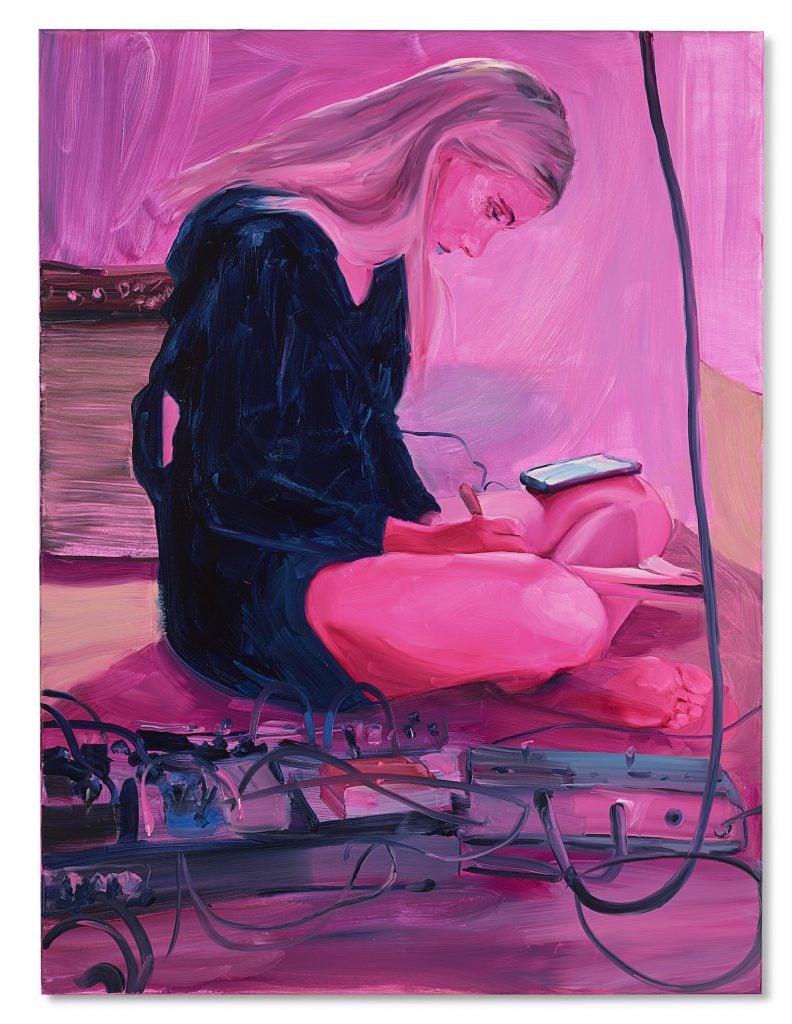
We look at the lots that overperformed last week and consider what it tells us about the state of the market.

Artnet News

While the mood this auction season was mixed, and overall sales volume tepid at best, there were nonetheless standouts throughout the auction calendar. Amid last-minute withdrawals and passed lots were works that defied assumptions—and an otherwise dreary market climate—particularly for market professionals ready to look outside of the primetime events.
We combed through hundreds of offerings from this season’s day sales at Christie’s, Sotheby’s, and Phillips in New York to bring you a range of hot lots.
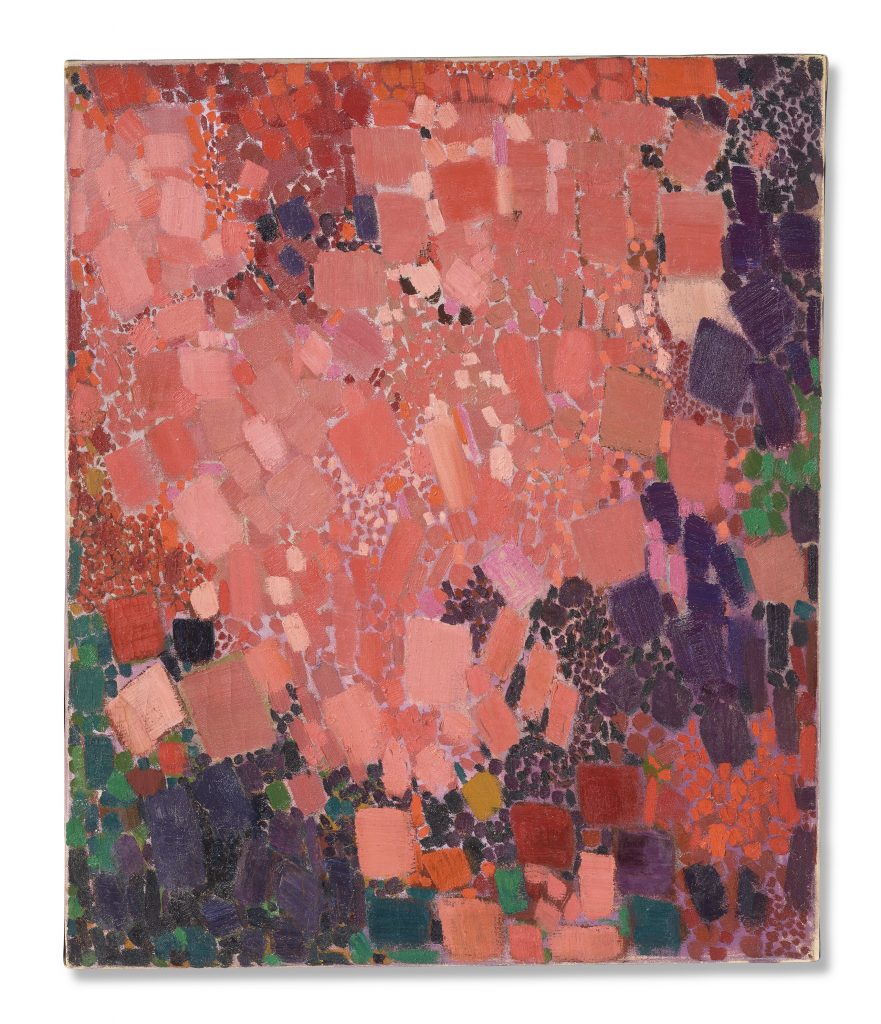
Lynne Drexler, Summer Blossom (1962). Courtesy of Christie’s Images, Ltd.
Auction: Christie’s, A Century of Art: The Gerald Fineberg Collection Part II
Estimate: $150,000 to $200,000
Sold for: $1.4 million
One of the last works acquired by Gerald Fineberg, who died in December 2022, this small canvas has a sumptuous palette and tight composition of cascading brushstrokes. The final price represented the second-highest result ever for the reclusive painter, whose oeuvre is being reexamined and whose market has been surging since the pandemic began.
Summer Blossom was the most expensive of the 14 lots by Drexler on the block in New York this month. Two years ago, the painting was included in Explosions of Color | Dimensions of Sound: The Art of Lynne Mapp Drexler at Jody Klotz Fine Art in Abilene, Texas. Printed on the cover of the show’s catalog, it had an asking price of just under $150,000, according to Klotz, who played an important role in Drexler’s recent market resurgence. She paid $75,000 for the artist’s Daffodil Gloucester in May 2021, the highest price for a Drexler piece at auction (it was estimated at $8,000 to $12,000).
Reluctant to sell the best works in her show, Klotz “decided to put prices that were unprecedented,” she said. “I had to scrape and search to make this show.” But she did end up selling the painting to an Italian collector, through a New York art adviser. Fineberg bought it about a year later; the painting was installed in his bathroom to brighten up his final days.
– Katya Kazakina
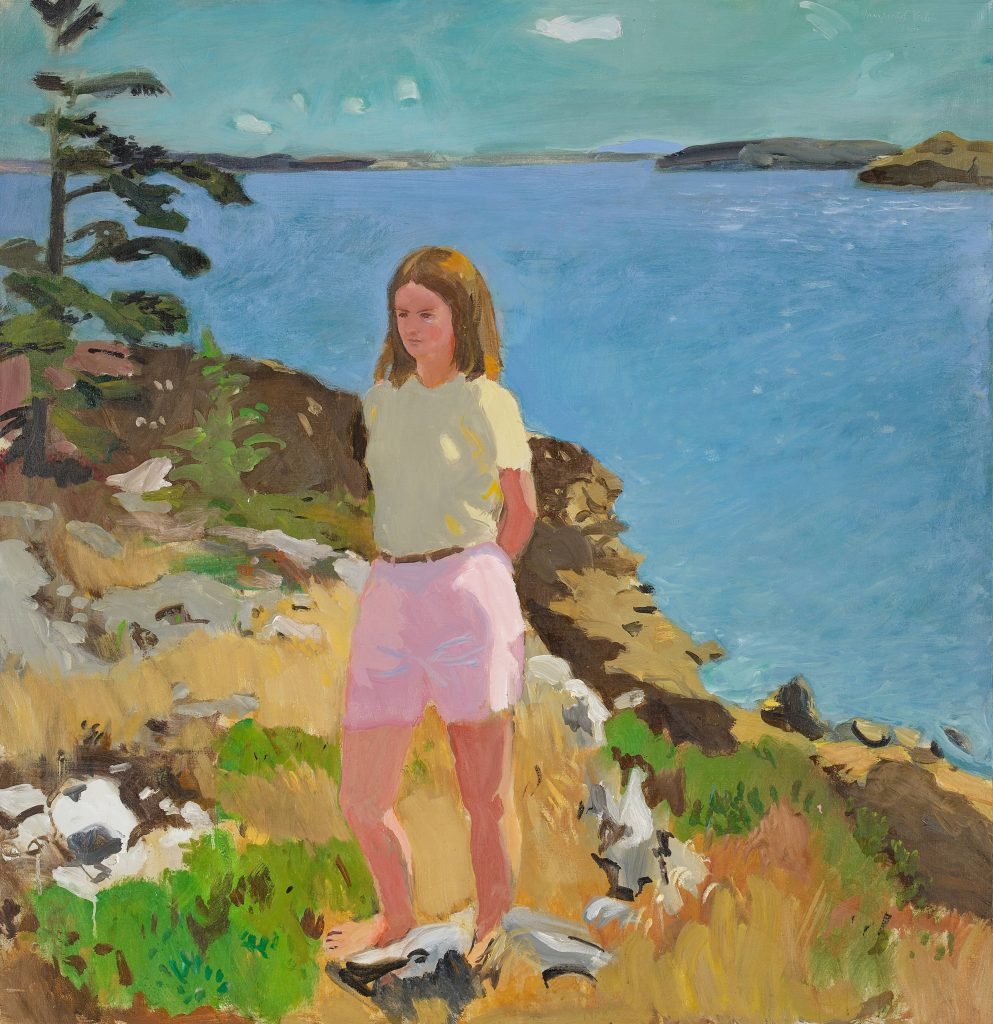
Fairfield Porter, Girl in a Landscape (1965). Courtesy of Sotheby’s.
Auction: Sotheby’s Contemporary Day Auction, May 19, New York
Estimate: $500,000 to $700,000
Sold for: $2.8 million
The sale of Fairfield Porter’s 1965 painting Girl in a Landscape set a new auction record for the American artist, nearly $1 million higher than the previous high-water mark, set in 2018, according to Artnet Price Database. The work was on the auction block for the first time since it was acquired by the previous owner in 1980. Sotheby’s declined to reveal who the consignor was, merely saying that it was a private corporate collection, but an archival catalog entry found in the Smithsonian Portrait Gallery indicates that the owner was United Missouri Bank of Kansas City.
The market for Porter’s art appears to be steady over the years, with regular sales of his paintings, drawings, and lithographs. But Girl in a Landscape, which depicts the artist’s eldest daughter Katie, outperformed the presale expectations with a price of $2.8 million (including fees), achieving a price four times the high estimate (premium-free).
Charlotte Mitchell, a specialist in Sotheby’s American art department, said the market’s enthusiasm was a response to the quality of the work, which combines “two of Fairfield Porter’s most celebrated motifs—depictions of the Maine landscape and portraits of his family.” Another landscape oil on panel work by Porter, Great Spruce Head, was offered at the same sale. It sold for $279,400, more than double the high estimate excluding fees.
– Vivienne Chow

Jenna Gribbon, Set List Focus (2020). Image courtesy Christie’s.
Auction: Christie’s Postwar & Contemporary Art Day Sale
Estimate: $40,000 to $60,000
Sold for: $403,200
As an admitted fan of Jenna Gribbon, I’ve enjoyed seeing her signature dreamy portraits, which curator and broadcaster Katy Hessel described as “almost electrically-coloured canvases,” everywhere from the Armory Show last fall, to the Frick Madison (as part of the program pairing contemporary works with the collection’s famous Old Masters), and recently as part of the buzzed about “Rear View” show at LGDR’s new Upper East Side mansion gallery space. Gribbon’s work in that show is actually included in a “pendant” presentation in a single room, titled “Full Frontal” that features more explicit works.
So perhaps it’s not entirely surprising that Set List Focus (2020), soared so far above estimate and set a new auction record. It depicts a female musician sitting on the floor of a stage amid a tangle of black wires, set against a day glo pink canvas. She appears focused on a presumably imminent musical performance. The second highest price of $123,400, a third of the current high, was achieved at Christie’s last fall. To date a total of 23 works by Gribbon have come to the auction block.
The painting “vibrated with energy…[and] has everything going for it,” said Kathryn Widing, co-head of the Post-War and contemporary day sale. “Gribbon’s unabashedly daring brushwork, a scene simultaneously familiar and otherworldly, and the pink neon hue of the paint, created a halo around the canvas. It was a painting that I kept coming back to enjoy during our preview.”
—Eileen Kinsella
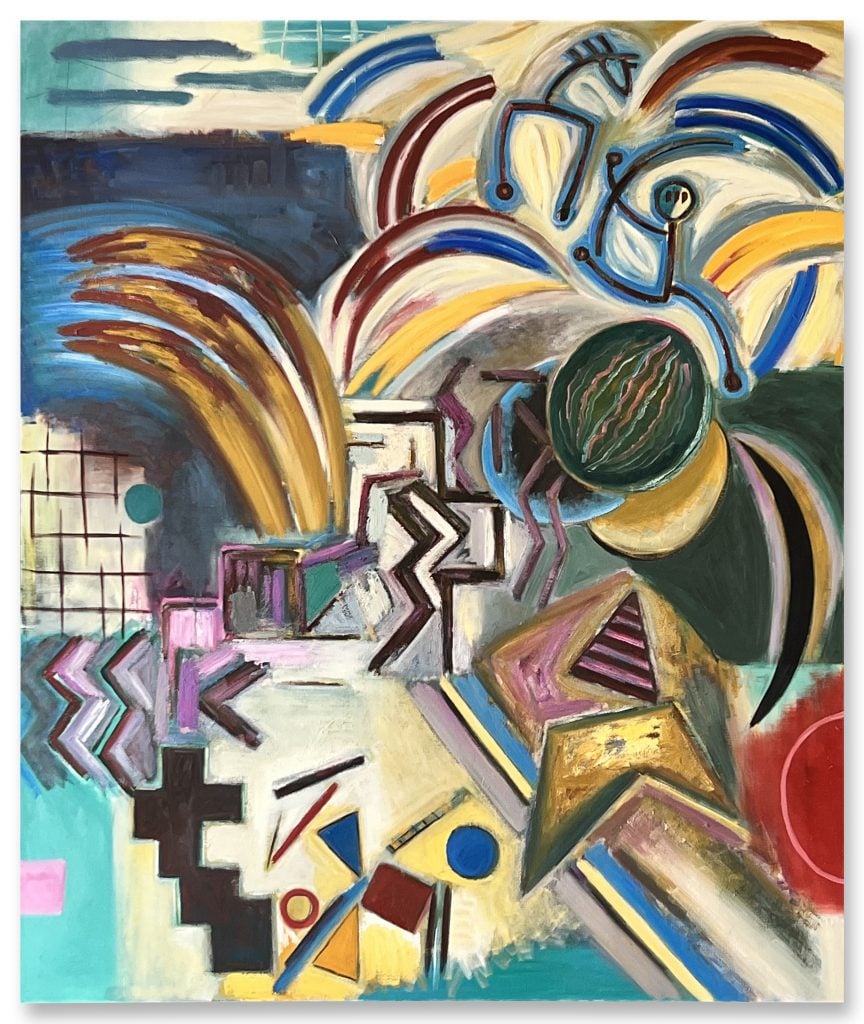
Jaune Quick-to-See Smith, Playground (1987). Courtesy of Sotheby’s.
Auction: Sotheby’s Contemporary Day Auction
Estimate: $100,000–$150,000
Sold for: $546,100
If you suspect that this propulsive result stems from April 2023, when Jaune Quick-to-See-Smith opened the first ever retrospective by a Native American artist at the Whitney Museum of American Art, your hunch is both correct and only one part of the story. Playground is, in fact, the tenth work by the artist to more than triple its high estimate (including fees) at auction since November 1, 2022, according to the Artnet Price Database. It’s also the seventh lot in that same span to sell for a premium-inclusive price of at least $337,500. Not bad for an artist whose auction apex was a mere $8,125 until December 2020.
The excitement around Quick-to-See-Smith’s practice undoubtedly has roots in her Whitney show, but that’s just one manifestation of the art establishment’s larger, late-breaking interest in contemporary artists hailing from Native American, First Nations, and Indigenous communities since roughly 2016. The succeeding years have seen Kwakwaka’wakw Northwest Coast artist Beau Dick’s work curated into Documenta 14 in 2017; Tlingit/Unangax̂ artist Nicholas Galanin featured in the 2019 Whitney Biennial; the Met commissioning murals by Canadian Cree artist Kent Monkman for the walls of its Great Hall that same year; and a selection of these and other Native American and First Nations artists appear in a variety of major art fairs over the past six-plus years, to name just a few examples.
It would be reductive (to say the least) to portray Quick-to-See-Smith’s recent success as strictly part of a macro-level trend. She has shown commercially with New York’s well-respected Garth Greenan Gallery since 2018, cultivated meaningful curatorial relationships for years, and developed a distinctive visual vocabulary with a combination of figuration and abstraction that fits the aesthetics of the moment. Sometimes personal vision, institutional recognition, and a broad shift in taste all coalesce.
—Tim Schneider
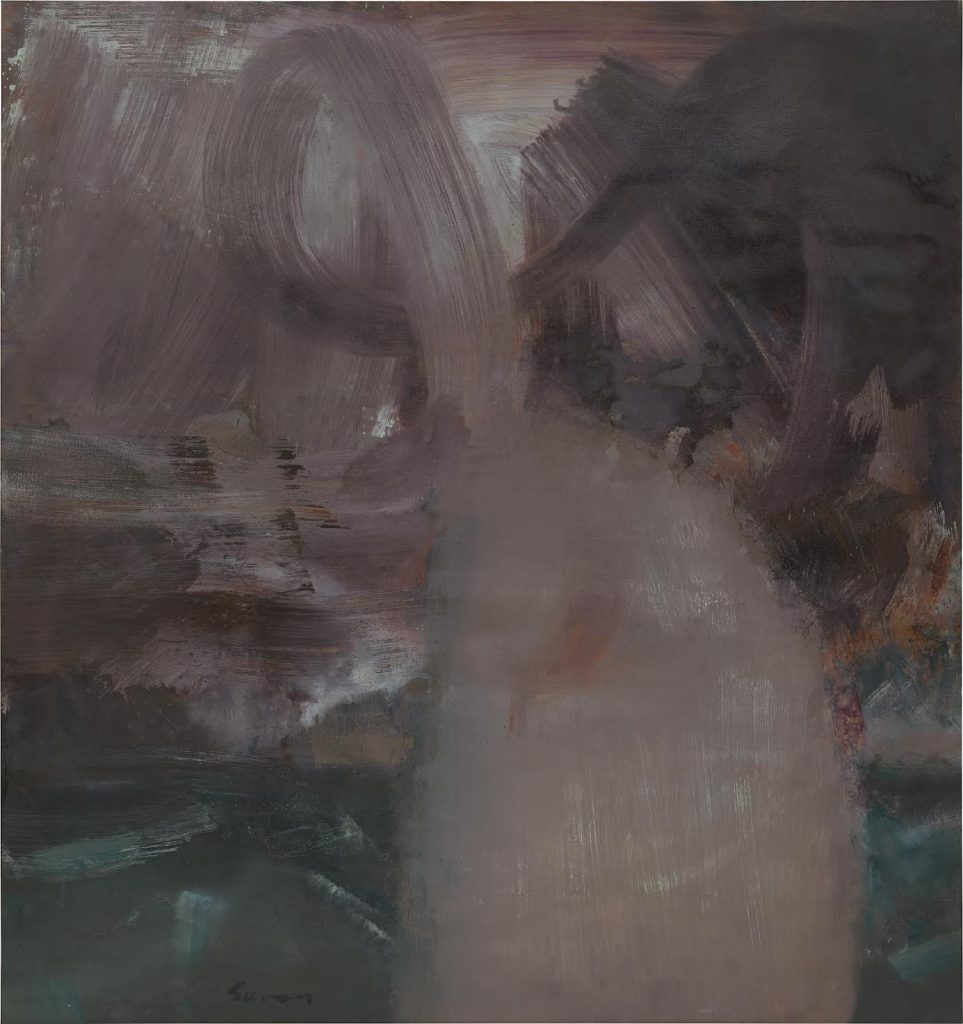
Maurice Sievan, Zoogarluk (1960). Courtesy of Phillips.
Auction: Phillips’s 20th Century and Contemporary Art Day Sale
Estimate: $15,000–$20,000
Sold for: $279,400
Typically, hot lots are associated with young, of-the-moment artists whose market is just beginning to pick up. But that’s not always the case, as proven by the runaway success of Maurice Sievan’s Zoogarluk (1960), which astounded at Phillips’s 20th Century and contemporary day sale when it netted $279,000, about thirteen times its high estimate of $20,000.
Sievan was a Russian painter who died in 1981 at the age of 82. His success came in the 1940’s, when he painted landscapes of the American suburbs, earning him the nickname “artist laureate of suburbia.” While his name isn’t often heard anymore, his work is in the permanent collections of the Queens Museum, the Brooklyn Museum, and the Hirshhorn.
What’s interesting about this piece’s success is that it’s a later, more abstract work, while Sievan’s practice is typically associated with a moodier, interpretive canvas. This was the artist’s auction debut. Other paintings of his are estimated to sell for just a few hundred dollars, according to the auction website Invaluable. To add to the mystery, Zoogarluk has no provenance, and was bought straight from the artist’s studio.
—Annie Armstrong